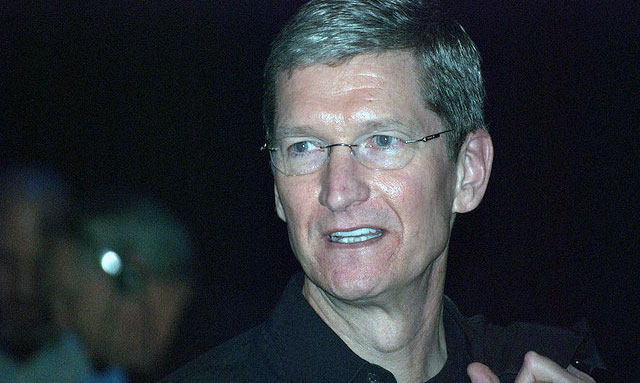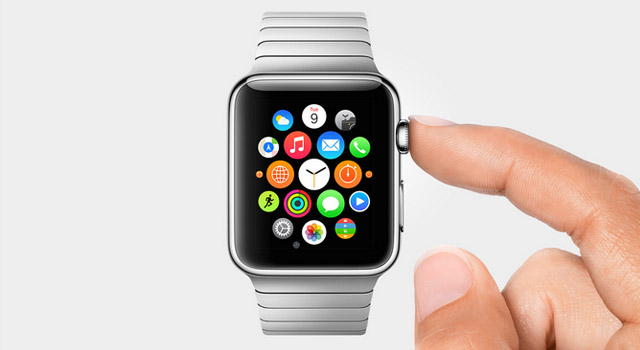 It’s a new era in Cupertino. Apple’s smartwatch, announced yesterday by CEO Tim Cook, represents a marked shift in strategy for a company over which founder and former CEO Steve Jobs still casts a big shadow.
It’s a new era in Cupertino. Apple’s smartwatch, announced yesterday by CEO Tim Cook, represents a marked shift in strategy for a company over which founder and former CEO Steve Jobs still casts a big shadow.
Apple’s two new smartphones — the iPhone 6 and the 6 Plus — and the Apple Watch weren’t exactly the best kept secrets ahead of the 9 September event.
Indeed, much of the speculation was on the money, although details of the Apple Watch — not the iWatch — were a bit of a mystery.
The watch, which will be three years in the making by the time it is launched commercially early next year, is more than just a timepiece for the wrist. It seems Apple has much bigger plans for the platform.
But the launch of two larger-screen iPhones and the watch signal a major departure from the company that Jobs curated so carefully.
Not only has Cook had his work cut since he took over from Jobs — arguably the biggest corporate shoes anyone could hope to fill — but many industry watchers believe this was his make or break moment.
The company needed a big new product, indeed a new category, something it had not achieved since the launch of the iPad more than four years ago. Has Cook delivered the goods with the Apple Watch?
The answer to that probably depends on which side of the fence you sit — whether you’re on of those who thinks Apple is the same, innovative company it was under Jobs, or one of those who subscribes to the idea that the company is now little more than a follower.
Certainly, Apple seems intent on setting out in a new direction. But the Apple Watch may just be a pointer to where it’s going rather than being that new direction in and of itself. The watch is paving the way for a much larger technology play.

It’s likely that wearable technologies are here to stay, but early implementations — Google Glass, fitness trackers, smartwatches — should be considered stepping stones towards truly functional gadgets. The gadgets being made today are little more than early experiments to see what sticks. Some technologies will gain traction and will get developed further; others will fail and fade into obscurity.
Pundits this week criticised Apple for launching technology that its competitors have had for many years already. Features like near-field communication and high-resolution displays have been available on Android devices for years. But Apple has always taken its time to evaluate the feasibility of the technologies it chooses, curating the best. It then sticks with those choices for the long term. The same will undoubtedly be true of its smartwatch.
The Apple Watch is not a unique product. LG, Samsung, Sony and Motorola are some of the big names already in the space. As with other products, Apple has chosen to consider its options carefully before proceeding. Actually, its watch is probably just one piece of a much larger puzzle: its play to tighten the integration of devices and the interoperability of those devices running iOS, to expand, if you like, the walled garden.
Apple showcased the health and fitness aspects of the Apple Watch, which is tightly integrated with Health, a new platform of features built into the iOS. The watch will also play an important role in Apple’s new payment process called Apple Pay and, along with the new iPhone, will allow users to make payments by simply waving the watch in front of a terminal at participating retailers and restaurants.

One of the most exciting features of the Apple Watch is the new user interface. Content can be zoomed in and out to make navigation easy and, although the screen is touch sensitive, a new “digital crown” provides the hardware scroll wheel needed to navigate the small screen.
It may not be perfect, but it’s a lot more intuitive than what we’ve seen from other smartwatch manufacturers.
But it’s still early days and we’ll have to wait for the deployment of Android L, the next version of Google’s mobile operating system, before we can call a clear winner in this category — if, indeed, we ever can.
Regardless of this, because Apple controls its entire ecosystem and has made a huge play in the financial services sector with Apple Pay, it is likely to again drive industry trends in its favour.
So, did Cook succeed with this year’s iPhone launch. Yes. The company looks set to be a disruptive force once again. If Jobs were still alive, he’d be applauding the direction his successor is taking the company he once led with such aplomb. — © 2014 NewsCentral Media
- Regardt van der Berg is a senior journalist at TechCentral. Find him on Twitter




